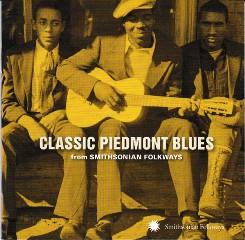Classic Piedmont Blues (From Smithsonian Folkways) [2017]
Classic Piedmont Blues (From Smithsonian Folkways) [2017]

1 –John Jackson - Truckin' Little Baby 3:00
Guitar, Vocals – John Jackson
Written-By – Fulton Allen
2 –John Cephas And Phil Wiggins - Mamie 4:13
Guitar, Vocals – John Cephas
Harmonica – Phil Wiggins
Written-By – Fulton Allen
3 –Warner Williams And Eddie Pennington -Hey Bartender, There's A Big Bug In My Beer 2:47
Guitar – Eddie Pennington
Guitar, Vocals – Warner Williams
Written-By – Vern Orr
4 –Brownie McGhee And Sonny Terry - Confusion 3:21
Drums – Gene Moore
Guitar, Vocals – Brownie McGhee
Harmonica, Vocals – Sonny Terry
Written-By – Walter McGhee
5 –Josh White - T.B. Blues 3:24
Guitar, Vocals – Josh White
Written-By – Victoria Spivey
6 –Baby Tate - If I Could Holler Like A Mountain Jack 3:06
Guitar, Vocals – Baby Tate
Written-By – Traditional
7 –Hobart Smith - Clog Dance 1:09
Guitar, Other [Dance] – Hobart Smith
Written-By – Traditional
8 –Brownie McGhee - Daisy 3:27
Guitar, Vocals – Brownie McGhee
Written-By – Walter McGhee
9 –Elizabeth Cotten - Going Down The Road Feeling Bad 2:13
Guitar, Vocals – Elizabeth Cotten
Written-By – Traditional
10 –Pink Anderson I Got A Woman 'Cross Town 1:56
Guitar, Vocals – Pink Anderso
nWritten-By – Ray Charles, Renald J. Richard
11 –John Jackson - Red River Blues 3:01
Guitar, Vocals – John Jackson
Written-By – Traditional
12 –Warner Williams And Jay Summerour - I Ain't Gonna Pick No More Cotton 3:50
Guitar, Vocals – Warner Williams
Harmonica – Jay Summerour
Written-By – Big Bill Broonzy
13 –Sonny Terry And Brownie McGhee - Sweet Woman 3:06
Guitar – Brownie McGhee
Harmonica, Vocals – Sonny Terry
Written-By – Saunders Terrell
14 –Doc Watson The Train That Carried My Girl From Town 2:22
Arranged By – Arthel Lane Watson
Guitar, Vocals – Doc Watson
Written-By – Traditional
15 –Reverend Gary Davis - Mountain Jack 3:31
Arranged By – Gary Davis
Guitar – Reverend Gary Davis
Written-By – Traditional
16 –John Cephas And Phil Wiggins - Crow Jane 3:04
Guitar, Vocals – John Cephas
Harmonica – Phil Wiggins
Written-By – Traditional
17 –Brownie McGhee - Fore Day Creep 4:14
Guitar, Vocals – Brownie McGhee
Written-By – Ida Cox
18 –Roscoe Holcomb Sittin' On Top Of The World 2:43
Banjo, Vocals – Roscoe Holcomb
Written-By – Lonnie Chatmon, Walter Vinson
19 –Pink Anderson - Meet Me In The Bottom 3:33
Guitar, Vocals – Pink Anderson
Written-By – Buddy Moss
20 –Sonny Terry, Brownie McGhee , And J.C. Burris - Dirty Mistreater 3:01
Guitar – Brownie McGhee
Harmonica – J.C. Burris
Harmonica, Vocals – Sonny Terry
Written-By – Saunders Terrell
21 –Archie Edwards - The Road Is Rough And Rocky 3:24
Written-By, Guitar, Vocals – Archie Edwards
With a selection of indelible recordings made over 70 years, Classic Piedmont Blues captures the essence of this fascinating blues tradition. Originating in the foothills of Southern Appalachia, the Piedmont blues served as a breeding ground for cross-pollination between traditions: rural and urban, black and white, country and coastal. Swept up on the tide of the Great Migration, it was carried from the Carolinas and Virginia, north and east through Maryland and Washington, D.C., to New York City and back again. Featuring influential artists like John Jackson, Cephas & Wiggins, Sonny Terry & Brownie McGhee, and many others, this collection offers an illuminating overview of the Piedmont style. ---folkways.si.edu
Smithsonian Folkways‘ Classic Piedmont Blues, is the 27th title in the label’s award-winning Classic Series. It captures the essence of a fascinating blues tradition with a selection of indelible recordings made over 70 years. Available March 24th, Classic Piedmont Blues offers an illuminating overview of the Piedmont style. The album features influential artists such as John Jackson, Cephas & Wiggins, Sonny Terry & Brownie McGhee, Doc Watson, and many others. Additionally, it includes a 40-page booklet with track notes and a brief history of the style that fostered a cross-pollination between traditions.
Piedmont, which literally means, “the foot of the mountain,” began as a blues style centered in Southern Appalachia, from Virginia through the Carolinas and into northern Georgia. The music was swept up on the tide of the Great Migration and carried northeast through Maryland and Washington, D.C., to New York City.
Despite the scattered presence of piano and harmonica players, Piedmont blues evolved into a guitar-driven style. Moreover, even when electric guitars became available, Piedmont blues remained an acoustic tradition. It also employed a complex thumb and finger-picking style that has remained fairly consistent despite local and individual variations. Unlike blues styles that came out of segregated urban locations, the Piedmont blues developed in a more rural, often integrated setting where the transmission of playing styles and techniques occurred more freely.
The 21-track set was compiled from the vast archives of Smithsonian Folkways and annotated by music historian Barry Lee Pearson. Pearson, a professor at the University of Maryland, previously produced three other titles in the Classic Series: Classic African American Songsters, Classic Harmonica Blues, and Classic American Ballads.
As with every compilation in the Smithsonian Folkways Classic Series, Classic Piedmont Blues explores the breadth and depth of a genre with incredible and unforgettable music. It also includes liner notes that offer insight into the cultural and historical contexts of each selection. During the last 10 years, Smithsonian Folkways has released Classic compilations of ballads, blues, children’s music, old-time fiddle, and protest songs, among others. ---JD Nash, americanbluesscene.com
download (mp3 @320 kbs):








